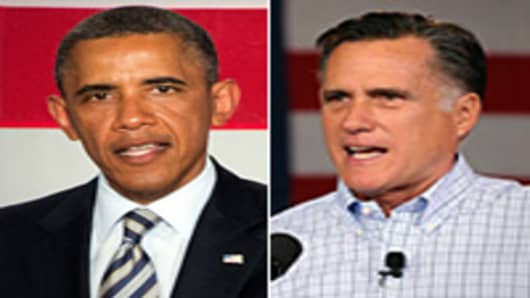With a current unemployment rate of 7.9 percent, getting the economy working again will likely be the top priority for whoever wins the White House in today's election.
As for what President Barack Obama and Mitt Romney say they will do if elected, here's a look at their ideas for the economy and the related issue of debt.
Obama: Obama's term has been marked by high unemployment from a deep recession that began under President George W. Bush. (Read More: Jobs and Election)
Obama responded to the recession with a $748 billion stimulus plan. And he continued the Wall Street and auto industry bailouts that began under his Republican predecessor.
To get the economy moving — and to create jobs — Obama has called, once again, for the passage of his $447 million American Jobs Act that he initially proposed in 2011. It was defeated in the Senate. The key elements of the package reprise parts of Obama's 2009 stimulus measure and a Social Security payroll tax cut enacted in 2010.
The plan combines payroll tax cuts for workers and businesses with $175 billion in spending on roads, school repairs and other infrastructure, as well as unemployment assistance and help to local governments to avoid layoffs of teachers, firefighters and police.
The jobs measure would be paid for by a 5.6 percent surcharge on income exceeding $1 million, expected to raise more than $450 billion over a decade, according to the Obama campaign.
Obama has also proposed tax breaks for U.S. manufacturers producing domestically or repatriating jobs from abroad, and tax penalties for U.S. companies outsourcing jobs.
Romney: Romney defended the 2008 bailout of financial institutions as a necessary step to avoid an economic collapse, but he strongly opposed the auto bailout. He has called for lower taxes, less regulation, a balanced budget and more trade deals to spur growth and get the economy moving.
He has also called to replace jobless benefits with unemployment savings accounts. And he proposes repeal of the Dodd-Frank Bill—the law toughening financial-industry regulations after the meltdown in that sector—and the law tightening accounting regulations in response to corporate scandals. Romney says Wall Street doesn't need more regulation which would stop the economy from investing and growing the economy. (Read More: Dodd-Frank Explained)
Federal Deficit
Obama: For the fourth-straight year the U.S. is projected to have trillion-dollar deficits. Obama has called for tackling the debt with a mix of spending cuts and revenue increases. Central to Obama's plan is to let Bush-era tax cuts expire for couples making more than $250,000. (Read More: What is National Debt?)
Romney:
The former Massachusetts governor would cap federal spending at 20 percent of gross domestic product by end of first term, down from 23.5 percent now, with largely unspecified spending cuts. He also favors a constitutional balanced budget amendment.



